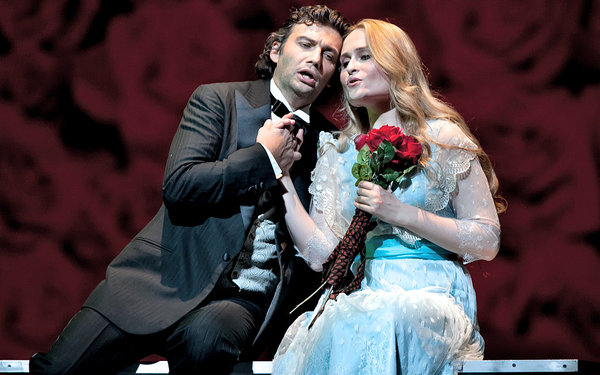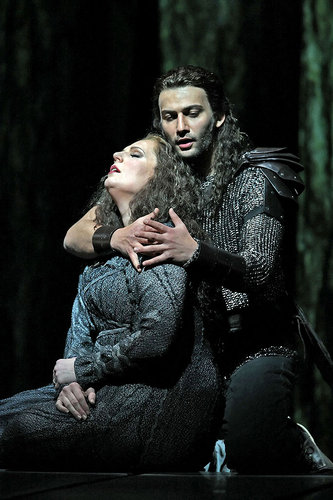|
|
|
|
|
|
|
| The NY Times, April 20, 2012 |
| By PETER G. DAVIS, Photo Walküre: Andrea Mohin/The New York Times, Photo Faust: Sara Krulwich/The New York Times |
| |
The Tenor Who Wants To Sing It All
|
|
|
  |
PLEASE don’t call Jonas Kaufmann “the German tenor”: it raises too many
preconceptions about a restricted repertory a German tenor should address,
and Mr. Kaufmann wants to sing it all. He seems to be doing just that with
major opera companies from New York to Vienna, performing an impressive
range of roles with a finely chiseled, deftly modulated lyric-dramatic voice
capped by a secure, ringing top.
Such distinctive vocal quality
would be enough to put any tenor’s career into orbit. But Mr. Kaufmann adds
patrician musicianship to the package along with something even more
uncommon: the perfect picture of what a romantic operatic hero should look
like but seldom does.
Last fall Mr. Kaufmann starred in the Met’s
production of Gounod’s “Faust,” and on Saturday he returns to sing Siegmund
in “Die Walküre” as part of the company’s first full performances of
Wagner’s “Ring” cycle in Robert Lepage’s new production. Few tenor roles
could be more dissimilar, stylistically or vocally, and these two present
exactly the sort of challenge Mr. Kaufmann seems to relish.
“Have
many other tenors ever sung Faust and Siegmund back to back?” he asked, more
genuinely curious than boastful, when interviewed the day after the Gounod
opera opened in November.
Long pause. Well, the fabled Polish tenor
Jean de Reszke did, but that was 125 years ago, and no one now knows what he
sounded like. (The only surviving evidence of his voice, faint snippets
caught live on Mapleson cylinders in 1901, really doesn’t count.) Plácido
Domingo has also sung both roles, but at the poles of a long career. No
matter. Mr. Kaufmann’s vocal versatility and flexibility at 42 are rare
qualities at any time, especially in these days of singer specialization and
compartmentalization.
“And yet only a few generations ago,” Mr.
Kaufmann pointed out, “nearly all singers moved easily from one style to
another. Just the other day we were listening to recordings of the wonderful
American mezzo-soprano Risë Stevens singing Wagner’s Fricka in 1940, Bizet’s
Carmen in 1950 and Mozart’s Cherubino in 1955, all of it fantastic. It’s
difficult now to convince theaters to accept that sort of versatility. We’re
all in danger of being typecast, and it took me a while to get past that
sort of thinking. Early in my career a manager actually asked me, ‘What’s a
German guy like you doing, singing Italian opera?’
“On the other
hand, if you have a success in a certain part, then every theater wants you
to sing the same role over and over. I could spend the next five years
performing nothing but Siegmund if I accepted all the offers that came my
way after I first sang the role here at the Met last year. Luckily I’m at a
sweet point in my career, when I can negotiate. O.K., I’ll sing the German
role for you this time, but when I return, I’d really like to do this or
that Italian part and maybe even a French opera. Now I can bargain, but it
was a real struggle before I reached that point.”
The struggle began
with Mr. Kaufmann’s first operatic engagement, in 1994 at the modest State
Theater in Saarbrücken, after he had completed a full five-year course of
study at the Academy of Music and Theater in Munich.
“Back then I
kept my voice sounding light and white, which was then felt to be proper for
a singer of my training and background. It was a bright, airy, flexible type
of German tenor in the Peter Schreier mold, suitable for Mozart or Rossini.
Everyone encouraged me that this was the best way to go, because I was young
and just getting started.
“But right away in Saarbrücken, where I had
to sing and learn a lot of new repertory in a very short time, I started to
have terrible technical difficulties. Instead of giving my voice the full
body support and muscular control that came naturally to me, I was squeezing
out the sound that I thought I wanted to hear. Thank God, I soon found
another teacher, who told me I was doing something completely wrong.”
That vocal guru turned out to be a retired American baritone, Michael
Rhodes, who had spent virtually his entire career singing in the small
German town of Trier, content to lead a comfortably inconspicuous life with
his family. I can confidently say that Mr. Rhodes might well have pursued a
major career had he wanted it, since I met him and heard him sing on a
chance visit to Trier in 1962 (seven years before Mr. Kaufmann was born).
The opera was Puccini’s “Tabarro,” and Mr. Rhodes’s cannily manipulated big,
burly voice practically blew the audience into the nearby Moselle River. At
any rate, Mr. Rhodes heard Mr. Kaufmann vocalize for a bit and immediately
set to work.
“His basic advice was very simple,” Mr. Kaufmann said.
“He told me I had to find my own voice and stop trying to sing with the one
I had artificially manufactured. It was a method that taught me how to trust
my own instincts and use my voice in a way that came most comfortably me.
Vocal instruction is almost always accomplished through the use of
metaphors, since the musculature involved in voice production is so complex
and abstract. Luckily Rhodes’s verbal imagery was one that I could
immediately grasp, translate and apply to my own special vocal problems and
technical needs. He helped me to take away all the stress and unhealthy
pressure from my instrument.”
Mr. Kaufmann felt at first that he did
lose much of his former flexibility, and the sound was a bit raw, but with
hard work everything smoothed out. “For the first time I had confidence in
my voice, and I knew I could sing for hours and hours without tiring,” he
said. “Some people still tell me that I am covering my voice and darkening
the tone too much in order to sing heavier, more dramatic roles, but this is
what works for me and what I’m comfortable with, so I figure it must be
right.
“I heard the same warnings when I started to mix my repertory
and not just sit in one box as a Mozart tenor, an Italian specialist, a
German lyric or whatever. I wanted to sing it all, but everybody told me no
one can do that and I will ruin my voice. Well, I thought, no tenor has
ranged over a more diverse repertory than Plácido Domingo, and he seems to
have survived quite successfully.”
Aside from his impressive vocal
endowment Mr. Kaufmann is also a true stage animal who can define and
differentiate characters with subtle precision. In person he may seem like
the unremarkable, pleasant fellow from next door, but onstage the
transformation into Alfredo, Werther, Don José or Lohengrin is complete.
Franco Corelli was a handsome Cavaradossi, but Mr. Kaufmann, just as
good looking, also lets you know exactly why Tosca finds him so irresistibly
erotic. I’m reminded of Elisabeth Schwarzkopf, who was said to arrive at the
stage door and be mistaken for the charwoman, only to emerge from her
dressing room looking drop-dead gorgeous, the most glamorous Marschallin in
the history of Strauss’s “Rosenkavalier.” Mr. Kaufmann practices the same
sort of stage alchemy.
Like all singers he must adapt his personal
views of a role to a director’s concept of the opera, and many directorial
ideas these days can be eccentric, to say the least. A good team player, Mr.
Kaufmann tries to adjust, but often with strong reservations.
What
did he think of the new Met production of “Faust” in which he had just sung?
No comment.
“I am too much of a diplomat,” he said. “But I will
generalize this much. Too many directors arrive at the opera house these
days knowing little or nothing about music. Most come from the spoken
theater, focus only on the text and don’t understand how to give the music
its space. It may seem obvious to you and me, but a brilliant theater
director does not automatically translate into a brilliant opera director.
If I am a crack racecar driver, that doesn’t qualify me to be an ace pilot
as well.
“I sometimes feel that directors devise all these elaborate
concepts because they don’t trust the power of the music and are terrified
of boring the audience. Opera is a truly magical art, but the magic
originates primarily in the music that we singers work so hard to
communicate.”
Undaunted nonetheless, Mr. Kaufmann forges ahead,
weaving spells whenever he can. Two formidable new roles will test his
resources this summer: Aeneas in Berlioz’s “Troyens” at Covent Garden in
London and Bacchus in Strauss’s “Ariadne auf Naxos” at the Salzburg
Festival.
The Met will star Mr. Kaufmann in a new production of
“Parsifal” next February, and after that he sings his first Manrico in
Verdi’s “Trovatore” back at his musical home in Munich. The big gaps among
all these performance dates are reserved for another important role, that of
the attentive husband and doting father of three.
“I also have
definite future plans for ‘Manon Lescaut,’ ‘Andrea Chénier’ and ‘Fanciulla
del West,’ ” Mr. Kaufmann said. “But heavier Wagner roles like Siegfried and
Tannhäuser are further off, with Otello and Tristan as even more distant
targets to shoot for. We’ll see. And then there are the operas I like to
dream about: ‘Pelléas,’ ‘Peter Grimes,’ Korngold’s ‘Die tote Stadt,’
Pfitzner’s ‘Palestrina.’ Perhaps I’ll never get around to singing everything
I’d like, but I still want to dance at as many musical marriages as I can.”
|
|
|
| |
|
|
|
|
|
|
|
|
|
|
|
|
|